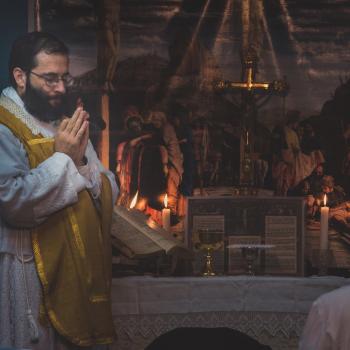One line from the USCCB’s statement on Monsignor Jeffrey Burrill’s resignation has bothered me: they state he is resigning “in order to avoid becoming a distraction.” Fidelity to your priestly vows seems much more than a “distraction”: it’s an important aspect of being a priest and leading as a priest in the Church. We should see celibacy as more than a “distraction.”
The statement stated above that line that the bishops “became aware of impending media reports alleging possible improper behavior by its general secretary, Monsignor Jeffrey Burrill.” There are only two possibilities for those reports. Either Burrill was serially involved in activities that a priest – let alone the general secretary of the bishop’s conference – should never do by regularly using Grindr (an app for gay hookups), or he wasn’t.

If he was repeatedly involved in improper behavior, then his resignation should be stated as something along the lines of “His lengthy pattern of reckless misbehavior is incompatible with exercising authority or judgment on the Church’s behalf,” “His repeated breaches of priestly celibacy,” or similar. This is not a “distraction.” We want a priest faithful to his promises in that role.
If he was not involved in improper behavior, then he should be given the platform to prove it. I am generally assuming the facts about Burrill’s use of Grindr in the report by The Pillar are true, but I have not seen the data nor a direct confirmation by experts beyond the ones The Pillar consulted for their story. If Burrill is completely innocent and The Pillar is making baseless accusations, then prove it. If that’s the case, we should eliminate The Pillar as a source for Catholic journalism. That would also not be a “distraction.” That would prevent others from being harmed by baseless accusations.
Burrill has not explicitly confirmed or denied the reports about his use of Grindr. The Pillar had indicated they had sent information and questions to Burrill and several other top USCCB officials first. If I were one of the others at the bishop’s conference, the first step would be to confront Burrill about this. If he admits it, drop the “alleging possible” acts, and “distraction,” and be forthcoming (see two paragraphs above). If he denies it, I’d have to make a moral judgment if this was sufficiently likely to warrant requesting Burrill resign. I’d look at the data, if needed, I’d even ask for raw data from The Pillar and check it. It would even be worth the USCCB’s money to pay an expert to check it if they aren’t sure examining it themselves.
Those who have seen more than was presented fully publicly should help the rest of us know if this information is true or false. Part of being a shepherd or bishop is to help the rest of us with moral judgments. This includes not just general judgments like following the ten commandments, but also particular judgments like the guilt of a certain public figure you worked with.
Calling it a “distraction” really seems to take away from the gravity of priestly promises. One of the main roles of bishops is moral guidance so moral judgments are not a “distraction” but an important part of their work. I ask the bishops who were given more information to come out with their moral judgment of whether the evidence seems to show Burrill was serially unfaithful to priestly celibacy or not. Leaving it as merely a “distraction” seems to lower the Church’s moral authority which is important in this time.
Treating this as merely a “distraction” seems to indicate that serial use of a hookup app by a priest is not a serious matter to face discipline for. If any priest is regularly using Tinder, Grindr, or other Hookup apps, they should at the very least be out of ministry for a period to deal with whatever is leading him astray, and often much more up to removal from the clerical state.
There are other euphemisms for sexual misconduct by clerics we should also retire. For example, back in 2019, First Things noted the following about a priest sharing images on Grindr with a minor but escaping legal prosecution as he thought the young man was over 18:
The declaration that his actions were “inappropriate…albeit not unlawful” is a misleading understatement. Sexual sins by clergymen, who are consecrated to fulfill in their persons Our Lord’s purposes, are forms of sacrilege. They thus grievously harm the Body of Christ, the Church. And “inappropriate” barely begins to describe the irreverence of a priest consecrating the sacred Body and Blood, hearing confession, and administering the other sacraments after sharing obscene images on social media.
Let’s treat sexual morality as more than a “distraction” or inappropriate. Teaching and encouraging morality is an essential part of the Church’s mission. Using euphemisms for such grave misconduct reduces our moral authority elsewhere. The Church needs to be the moral voice crying out in the moral desert of our nation to prepare the way of the Lord.
Notes:
- Thanks to Deacon Steven D. Greydanus who provided a line or two I used above with his permission and Shannon Last who lead me to the First Things article.
- If you appreciated this, please support me on Patreon so I can write more analysis on the news from the perspective of Catholic theology.












